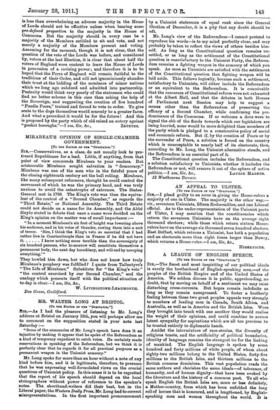MIRABEAU'S OPINION OF SINGLE-CHAMBER GOVERNMENT.
[TO THR EDITOR OF THZ "SPECTATOR...1
SIR,—Conservatives, as a class, do not usually look to pro- fessed Republicans for a lead. Little, if anything, from that point of view commends Mira.bean to your readers. But aristocratic Mirabeau sought salvation in "democracy." Mirabeau was one of the men who in the fateful years of the closing eighteenth century set the ball rolling. Mimbean, like many subsequent reformers, thought he could control the movement of which he was the primary head, and was truly anxious to avoid the catastrophe of extremes. The States- General met in 1789. The King's veto was then the equiva- lent of the control of a "Second Chamber," as regards the "Third Estate," or National Assembly. The Third Estate could not decide on a name for its Assembly, and the Abbe Sieyes stated in debate that once a name were decided on the King's opinion on the matter was of small importance In a moment Mirabeau's six feet of height was towering above his audience, and in his voice of thunder, cowing them into a sort of terror. 'Sirs, I think the King's veto so essential that I had rather live in Constantinople than in France if he did not have it I know nothing more terrible than the sovereignty of six hundred persons, who to-morrow will constitute themselves a permanent body, the next day hereditary, and will end by usurping everything."
They howled him down, but who does not know how truly Mirabeau's prophecy was fulfilled? I quote from Tallentyre's "The Life of Mimbeau." Substitute- for "the King's veto" "the control exercised by our Second Chamber," and the analogy which presents itself with the political situation of to-day is clear.—I am, Sir, &c.,






















































 Previous page
Previous page